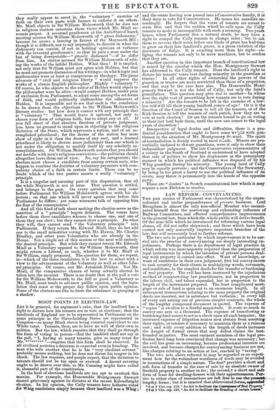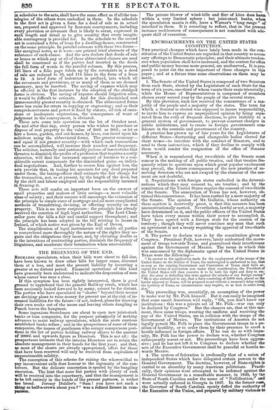LAW REFORM: CONVEYANCING.
THE past session of Parliament was characterized by the unpre- cedented and undue preponderance of private business. Lord Brougham is almost the only non-official Member who emanci- pated himself from the narrowing and exhausting influence of Railway Committees, and effected comprehensive improvements in the general law, from which the whole public will derive benefit. Of the nine bills which he introduced for reforming various legal abuses, all did not suffer shipwreck ; and those which have been carried not only materially improve important branches of the law, but will necessarily lead to further reforms. The two acts in particular by which improvement is to be car- ried into the practice of conveyancing are deeply interesting ex- periments. Perhaps there is no department of legal practice in which reform was more urgently required than the preparation of legal instruments by which the intention of private persons deal- ing with property is carried into effect. Want of knowledge, or want of confidence in their own judgment, first led conveyancers to seek security for their clients in multiplying words, covenants, and conditions, in the simplest deeds for the transfer or burdening of real property. The evil has been increased by the injudicious method of remunerating law practitioners, not in proportion to the labour, skill, and talent expended, but in proportion to the length of the instrument prepared. The least complicated mort- gage or sale of land is spun out to an enormous length. In all subsequent transactions relating to the same property the original deeds are inserted, not in substance but verbatim ; in every bill of every suit arising out of previous simpler contracts, the whole of the lengthy compound document is quoted. The expense of " copies " is swollen to a fearful magnitude. It costs as much to convey one acre as a thousand. The expense of transferring or burdening land comes to act as a check upon all such bargains; the increased expense of litigation makes men abstain from asserting their rights, or renders it necessary to maintain them at a ruinous cost ; and with every addition to the length of deeds increases the danger of formal errors that may defeat claims the best- founded in justice. The most eminent members of the legal pro- fession have long been convinced that change was necessary ; but the evil has gone on increasing, because professional interests are involved, and because charges for conveyancing business are not, like charges relating to an action at law, reached by "taxing." The two acts above referred to may be regarded as an experi- ment how far the redundant wordiness of deeds may be avoided in transactions of a simple nature. The first* provides a short and safe form of transfer in the case of sale by an absolute owner of freehold property to another in fee ; the second,-1- a short and safe form of lease for dwelling-houses with their appurtenances. Par- ties to either class of transactions are left free to use the present lengthy forms ; but it is enacted that abbreviated forma, appended
8 at 9 Viet. cap. 119, "An Act to facilitate the CooveyaDee of Real Property."
t 8 at 9 Viet. cap. 124, "An Act to facilitate the Granting of certain Loom" in schedules to the acts, shall have the same effect as if all the tau- tologies of the others were embodied in them. In the schedule to the first act is given a form for a deed of sale as in actual use, prepared and approved by first-rate conveyancers, including every provision or covenant that is likely to occur, expressed in such length and detail as to give security that every imagin- able contingency is provided for. In the schedule to the second act is contained a form of lease for a dwelling-house, constructed on the same principle. In parallel columns with these two forms— like marginal notes, as it were—are printed brief abstracts of the substance of each clause. And the acts declare that deeds of sale or leases m which any or all of these abbreviated clauses are used shall be construed as if the parties had inserted in the deeds the full form of words in the parallel column. By this process, 191 lines of a folio page taken up by the covenants in a deed of sale are reduced to 16, and 114 lines in the form of a lease to 19. A brief form of indenture is prefixed, into which all the covenants and provisions, or as many of them as are deemed necessary, may be inserted. The saving of expense which may be effected in the first instance by the adoption of the abridged forms is obvious. The saving of expense should litigation arise, it would be difficult to estimate. And for this diminished cost immeasurably greater security is obtained. The abbreviated forms leave less room for errors in copying or engrossing ; and as their comprehensiveness and power is fixed by statute, all risk of omis- sions or inadequate expressions, the consequence of want of judgment in the conveyancer, is obviated. These acts come into operation on the 1st of October next. On and after that day, every person who wishes to purchase or dispose of real property to the value of 2001. or 3001., or let or hire a house, garden, and out-houses, by lease, can insist upon his solicitors using tht abbreviated forms. The greater economy— and equal if not greater security—with which such transactions can be accomplished, will increase their number and frequency. The solicitor, naturally and pardonably jealous of innovations that threaten to diminish the profits of a profession that requires a costly education, will find the increased amount of business to a con- siderable extent compensate for the diminished gains on indivi- dual negotiations. And, further to secure him against loss, the acts provide that, in taxing his accounts for any deed prepared under them, the taxing-officer shall estimate the fair charge for the transaction, not, as at present, by the length of the deed, but by the skill and labour employed and the responsibility incurred in framing it. These acts will confer an important boon on the owners of small properties and makers of little savings—a most valuable class of society; and their success will encourage the extension of the principle to simple cases of mortgage and all more complicated methods of transferring, devising, or effecting security on real property. This is no mere conjecture: the principle has already received the sanction of high legal authorities. The Lord Chan- cellor gave the bills a fair and candid support throughout; and the principle has been adopted in the bill relating to leases in Ireland, of which notice was given by the Earl of Devon. The simplification of legal instruments will enable all parties to comprehend more thoroughly the nature of the rights they ac- quire and the obligations they incur, and, by obviating doubts as to the intentions of contracting parties, diminish the frequency of litigations, and accelerate their termination when unavoidable.



























 Previous page
Previous page